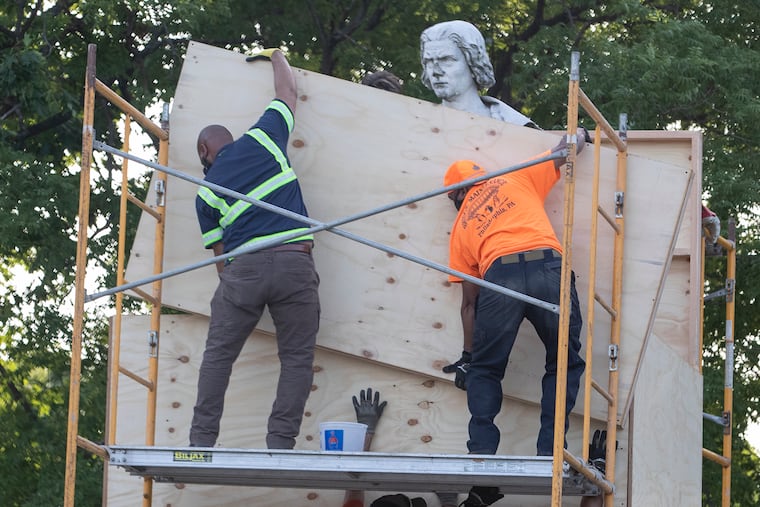Philly prosecutor lobbying for statue: Columbus was a ‘civil-rights activist’
The history buff was introduced as an attorney for the Commonwealth of Pennsylvania on an online interview program in February to outline his research into Columbus’ little-known role as “the first civil-rights activist of the Americas.”

Those calling for the removal of the Christopher Columbus statue at Marconi Plaza in South Philadelphia have few kind words to say about the explorer.
City Councilmember Kendra Brooks classed it among Philadelphia’s “monuments to police brutality, racism, colonization, and oppression.” And Mayor Jim Kenney called Columbus infamous, saying he “enslaved indigenous people and punished those who failed to meet his expected service by severing limbs, or in some cases, murder.”
But Columbus does have at least one avid supporter in city government: Assistant District Attorney Robert Petrone. The history buff was introduced as an attorney for the commonwealth on an online interview program in February to outline his research into what he calls Columbus’ little-known role as “the first civil-rights activist of the Americas” and as the victim of a 500-year-old smear campaign being advanced by globalist forces.
“One of the things that this sort of coalition of anti-Western-culture advocates are doing to bring down what they perceive to be their ideological adversary, the West, is a multi-pronged attack — one of the prongs of which is the attacking of American icons,” Petrone said on the video. “They’re doing this in an attempt to turn hearts and minds against Western culture, cast it in a sinister light.”
» READ MORE: Crews cover base of Columbus monument at Penn’s Landing as nonprofit considers removal
Among historians, the question of Columbus’ motives toward indigenous people is considered settled, said Kris E. Lane, a professor of colonial Latin American history at Tulane University. That Columbus sought to lay claim to land and access commodities, including human captives, is documented “in his own log books,” Lane said.
That has not stopped hundreds of people from cribbing from a letter, recently circulated under Petrone’s name, urging City Councilmember Mark Squilla to object to the statue’s removal.
“Feel free to use any or all of the following twelve reasons why Columbus was the first civil-rights activist of the Americas to buttress your demand,” the letter reads. One example: Columbus “intervened always as a pacifying force against the greedy and entitled Spanish nobles who defied his governance and indulged in mutual hostilities with the indigenes.”
Petrone did not respond to phone and email messages on Wednesday.
Jane Roh, a spokesperson for District Attorney Larry Krasner, said in an email: “Mr. Petrone’s ahistorical opinions about Christopher Columbus are not representative of the District Attorney’s Office, nor are they shared by District Attorney Krasner personally. Larry is proud of the fact that our ADAs and staff are more representative of the communities we serve than under prior administrations, and he continues to proactively make sure that the DAO is a welcoming, inclusive, and respectful place to work.”
Jody Della Barba, an advocate with the 1492 Society who previously defended the statue of former Mayor Frank L. Rizzo, called Petrone “an expert” who “has extensively researched Columbus, and he spoke at our proclamations and different events.” She said his research had “totally debunked” the stories of Columbus’ misdeeds.
Councilmember Kenyatta Johnson, in whose district the statue sits, did not immediately respond to a request for comment. But Squilla, whose district abuts but does not include Marconi Plaza, said he doesn’t support removing the statue
He does support a transparent and orderly process for such debates, he said: “If we constantly start removing stuff because people have disagreements with it, we’ll be removing everything in the city of Philadelphia.”
Squilla said he found Petrone’s arguments — which aim to discredit in particular the historian Howard Zinn’s accounts of Columbus as a violent oppressor — to be convincing. “Zinn got his information from a person who was a political adversary to Columbus, and if you look at that information, where it came from, it would be like Donald Trump writing the history of the Clintons,” Squilla said.
Camilla Townsend, a history professor at Rutgers University, said that interpretation misunderstands the history of Columbus. She said, “The idea that he was a civil-rights activist is really very funny. He did initiate the slave trade of native Americans.”
» READ MORE: The Christopher Columbus statue: Why it’s an issue right now
Lane, the Tulane professor, encouraged anyone questioning that narrative to read Columbus’ own journals.
“The idea that he was defamed by someone else and therefore there’s some positive side of Columbus, that he was a defender of Native American rights, just doesn’t hold up,” Lane said. “He said from the beginning, their bodies are very finely formed and they would make excellent slaves — and he sent some right back” to Queen Isabella I in Spain. “And she said, ‘What? I didn’t ask for this.’”
Petrone’s passion for Columbus is well known in the District Attorney’s Office. Last year, when a supervisor sent an all-staff email reminding workers the office would close for “the federal holiday,” Petrone responded that it was Christopher Columbus Day and staff should “enjoy your celebration of the Western World’s first Civil Rights Activist!”
Emails obtained by the Inquirer then show a heated exchange with other staff members, who preferred Indigenous Peoples Day and said they were offended by Petrone’s celebration of such a problematic figure. The exchanges ended with a warning from First Assistant District Attorney Robert Listenbee that such conversations should be reserved for personal email or social media.
Petrone’s interview appeared on an internet show called The Advocates hosted by Dan Cirucci, a local conservative blogger. On it, Petrone says Columbus petitioned for civil-rights protections for indigenous peoples, and protected them against more cruel settlers and rulers.
And, he argued, “Christopher Columbus had a full-blooded [adopted] Taino son that he loved and raised: He was not a racist.”